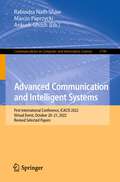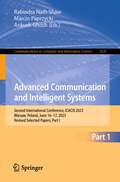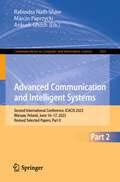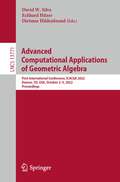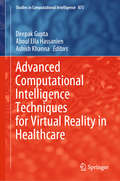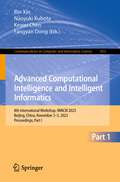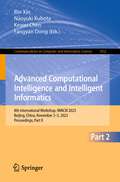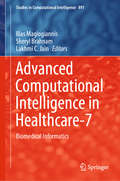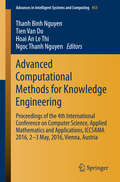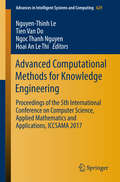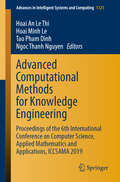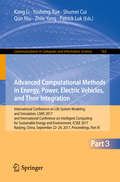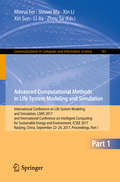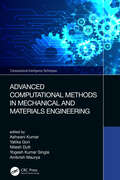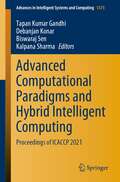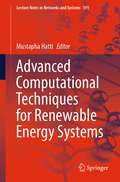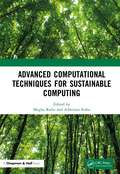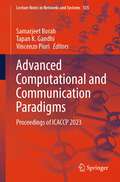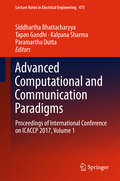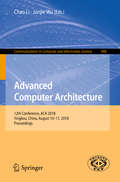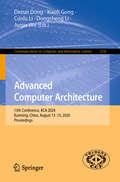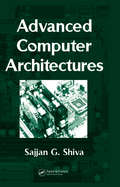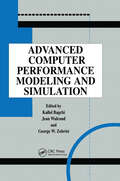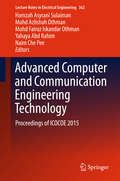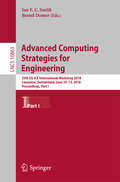- Table View
- List View
Advanced Communication and Intelligent Systems: First International Conference, ICACIS 2022, Virtual Event, October 20-21, 2022, Revised Selected Papers (Communications in Computer and Information Science #1749)
by Marcin Paprzycki Ankush Ghosh Rabindra Nath ShawThis book constitutes selected papers presented at the First International Conference on Advanced Communication and Intelligent Systems, ICACIS 2022, held as a virtual event in October 2022.The 69 papers were thoroughly reviewed and selected from the 258 subissions. The book focuses on current development in the fields of communication and intelligent systems.
Advanced Communication and Intelligent Systems: Second International Conference, ICACIS 2023, Warsaw, Poland, June 16–17, 2023, Revised Selected Papers, Part I (Communications in Computer and Information Science #1920)
by Marcin Paprzycki Ankush Ghosh Rabindra Nath ShawThis book constitutes the refereed proceedings of the Second International Conference on Advanced Communication and Intelligent Systems, ICACIS 2023, held in Warsaw, Poland, during June 16–17, 2023The 22 full papers included in this book were carefully reviewed and selected from 221 submissions. They were organized in topical sections as follows: Wireless Communication, Artificial Intelligence and Machine Learning, Robotics & Automation, Data Science, IoT and Smart Applications
Advanced Communication and Intelligent Systems: Second International Conference, ICACIS 2023, Warsaw, Poland, June 16–17, 2023, Revised Selected Papers, Part II (Communications in Computer and Information Science #1921)
by Marcin Paprzycki Ankush Ghosh Rabindra Nath ShawThis book constitutes the refereed proceedings of the Second International Conference on Advanced Communication and Intelligent Systems, ICACIS 2023, held in Warsaw, Poland, during June 16–17, 2023The 43 full papers included in this book were carefully reviewed and selected from 221 submissions. They were organized in topical sections as follows: Wireless Communication, Artificial Intelligence and Machine Learning, Robotics & Automation, Data Science, IoT and Smart Applications
Advanced Computational Applications of Geometric Algebra: First International Conference, ICACGA 2022, Denver, CO, USA, October 2-5, 2022, Proceedings (Lecture Notes in Computer Science #13771)
by Dietmar Hildenbrand Eckhard Hitzer David W. SilvaThis book constitutes the post-conference proceedings of the First International Conference on Advanced Computational Applications of Geometric Algebra, ICACGA 2022, held in Denver, CO, USA, during October 2-5, 2022. The 18 full papers presented in this book together with 12 abstracts of invited talks were carefully reviewed and selected from 24 submissions. The papers are grouped in the following topical sections: geometric applications; computer science applications; technological applications; and applications to physics and mathematics.
Advanced Computational Intelligence Techniques for Virtual Reality in Healthcare (Studies in Computational Intelligence #875)
by Aboul Ella Hassanien Deepak Gupta Ashish KhannaThis book addresses the difficult task of integrating computational techniques with virtual reality and healthcare. It discusses the use of virtual reality in various areas, such as healthcare, cognitive and behavioural training, understanding mathematical graphs, human–computer interaction, fluid dynamics in healthcare industries, accurate real-time simulation, and healthcare diagnostics.Presenting the computational techniques for virtual reality in healthcare, it is a valuable reference resource for professionals at educational institutes as well as researchers, scientists, engineers and practitioners in industry.
Advanced Computational Intelligence and Intelligent Informatics: 8th International Workshop, IWACIII 2023, Beijing, China, November 3–5, 2023, Proceedings, Part I (Communications in Computer and Information Science #1931)
by Naoyuki Kubota Kewei Chen Bin Xin Fangyan DongThis two-volume set constitutes the refereed proceedings of the 8th International Workshop on Advanced Computational Intelligence and Intelligent Informatics, IWACIII 2023, held in Beijing, China, in November 2023.The 56 papers presented were thoroughly reviewed and selected from the 118 qualifies submissions. They are organized in the topical sections on intelligent information processing; intelligent optimization and decision-making; pattern recognition and computer vision; advanced control; multi-agent systems; robotics.
Advanced Computational Intelligence and Intelligent Informatics: 8th International Workshop, IWACIII 2023, Beijing, China, November 3–5, 2023, Proceedings, Part II (Communications in Computer and Information Science #1932)
by Naoyuki Kubota Kewei Chen Bin Xin Fangyan DongThis two-volume set constitutes the refereed proceedings of the 8th International Workshop on Advanced Computational Intelligence and Intelligent Informatics, IWACIII 2023, held in Beijing, China, in November 2023.The 56 papers presented were thoroughly reviewed and selected from the 118 qualifies submissions. They are organized in the topical sections on intelligent information processing; intelligent optimization and decision-making; pattern recognition and computer vision; advanced control; multi-agent systems; robotics.
Advanced Computational Intelligence in Healthcare-7: Biomedical Informatics (Studies in Computational Intelligence #891)
by Lakhmi C. Jain Sheryl Brahnam Ilias MaglogiannisThis book presents state-of-the-art works and systematic reviews in the emerging field of computational intelligence (CI) in electronic health care. The respective chapters present surveys and practical examples of artificial intelligence applications in the areas of Human-Machine Interface (HMI) and affective computing, machine learning, big health data and visualization analytics, computer vision and medical image analysis. The book also addresses new and emerging topics in CI for health care such as the utilization of Social Media (SM) and the introduction of new intelligent paradigms in the security and privacy domains, which are critical for the health sector. The chapters, while of course not exhaustively addressing all the possible aspects of the aforementioned areas, are indicative of the dynamic nature of interdisciplinary research being pursued. Accordingly, the book is intended not only for researchers in the respective fields, but also for medical and administrative personnel working in the health sector, as well as managers and stakeholders responsible for making strategic decisions and defining public health policies.
Advanced Computational Methods for Knowledge Engineering: Proceedings of the 4th International Conference on Computer Science, Applied Mathematics and Applications, ICCSAMA 2016, 2-3 May, 2016, Vienna, Austria (Advances in Intelligent Systems and Computing #453)
by Ngoc Thanh Nguyen Thanh Binh Nguyen Tien Van Do Hoai An Le ThiThis proceedings consists of 20 papers which have been selected and invited from the submissions to the 4th International Conference on Computer Science, Applied Mathematics and Applications (ICCSAMA 2016) held on 2-3 May, 2016 in Laxenburg, Austria. The conference is organized into 5 sessions: Advanced Optimization Methods and Their Applications, Models for ICT applications, Topics on discrete mathematics, Data Analytic Methods and Applications and Feature Extractio, respectively. All chapters in the book discuss theoretical and practical issues connected with computational methods and optimization methods for knowledge engineering. The editors hope that this volume can be useful for graduate and Ph.D. students and researchers in Applied Sciences, Computer Science and Applied Mathematics.
Advanced Computational Methods for Knowledge Engineering: Proceedings of the 5th International Conference on Computer Science, Applied Mathematics and Applications, ICCSAMA 2017 (Advances in Intelligent Systems and Computing #629)
by Ngoc Thanh Nguyen Tien Van Do Hoai An Le Thi Nguyen-Thinh LeThe proceedings consists of 30 papers which have been selected and invited from the submissions to the 2nd International Conference on Computer Science, Applied Mathematics and Applications (ICCSAMA 2014) held on 8-9 May, 2014 in Budapest, Hungary. The conference is organized into 7 sessions: Advanced Optimization Methods and Their Applications, Queueing Models and Performance Evaluation, Software Development and Testing, Computational Methods for Mobile and Wireless Networks, Computational Methods for Knowledge Engineering, Logic Based Methods for Decision Making and Data Mining and Nonlinear Systems and Applications, respectively. All chapters in the book discuss theoretical and practical issues connected with computational methods and optimization methods for knowledge engineering. The editors hope that this volume can be useful for graduate and Ph. D. students and researchers in Computer Science and Applied Mathematics. It is the hope of the editors that readers of this volume can find many inspiring ideas and use them to their research. Many such challenges are suggested by particular approaches and models presented in individual chapters of this book.
Advanced Computational Methods for Knowledge Engineering: Proceedings of the 6th International Conference on Computer Science, Applied Mathematics and Applications, ICCSAMA 2019 (Advances in Intelligent Systems and Computing #1121)
by Ngoc Thanh Nguyen Hoai An Le Thi Hoai Minh Le Tao Pham DinhThis proceedings book contains 37 papers selected from the submissions to the 6th International Conference on Computer Science, Applied Mathematics and Applications (ICCSAMA 2019), which was held on 19–20 December, 2019, in Hanoi, Vietnam. The book covers theoretical and algorithmic as well as practical issues connected with several domains of Applied Mathematics and Computer Science, especially Optimization and Data Science. The content is divided into four major sections: Nonconvex Optimization, DC Programming & DCA, and Applications; Data Mining and Data Processing; Machine Learning Methods and Applications; and Knowledge Information and Engineering Systems. Researchers and practitioners in related areas will find a wealth of inspiring ideas and useful tools & techniques for their own work.
Advanced Computational Methods in Energy, Power, Electric Vehicles, and Their Integration: International Conference on Life System Modeling and Simulation, LSMS 2017 and International Conference on Intelligent Computing for Sustainable Energy and Environment, ICSEE 2017, Nanjing, China, September 22-24, 2017, Proceedings, Part III (Communications in Computer and Information Science #763)
by Kang Li, Yusheng Xue, Shumei Cui, Qun Niu, Zhile Yang and Patrick LukThe three-volume set CCIS 761, CCIS 762, and CCIS 763 constitutes the thoroughly refereed proceedings of the International Conference on Life System Modeling and Simulation, LSMS 2017, and of the International Conference on Intelligent Computing for Sustainable Energy and Environment, ICSEE 2017, held in Nanjing, China, in September 2017. The 208 revised full papers presented were carefully reviewed and selected from over 625 submissions.The papers of this volume are organized in topical sections on: Biomedical Signal Processing; Computational Methods in Organism Modeling; Medical Apparatus and Clinical Applications; Bionics Control Methods, Algorithms and Apparatus; Modeling and Simulation of Life Systems; Data Driven Analysis; Image and Video Processing; Advanced Fuzzy and Neural Network Theory and Algorithms; Advanced Evolutionary Methods and Applications; Advanced Machine Learning Methods and Applications; Intelligent Modeling, Monitoring, and Control of Complex Nonlinear Systems; Advanced Methods for Networked Systems; Control and Analysis of Transportation Systems; Advanced Sliding Mode Control and Applications; Advanced Analysis of New Materials and Devices; Computational Intelligence in Utilization of Clean and Renewable Energy Resources; Intelligent Methods for Energy Saving and Pollution Reduction; Intelligent Methods in Developing Electric Vehicles, Engines and Equipment; Intelligent Computing and Control in Power Systems; Modeling, Simulation and Control in Smart Grid and Microgrid; Optimization Methods; Computational Methods for Sustainable Environment.
Advanced Computational Methods in Life System Modeling and Simulation: International Conference on Life System Modeling and Simulation, LSMS 2017 and International Conference on Intelligent Computing for Sustainable Energy and Environment, ICSEE 2017, Nanjing, China, September 22-24, 2017, Proceedings, Part I (Communications in Computer and Information Science #761)
by Xin Li Xin Sun Zhou Su Minrui Fei Shiwei Ma Li JiaThe three-volume set CCIS 761, CCIS 762, and CCIS 763 constitutes the thoroughly refereed proceedings of the International Conference on Life System Modeling and Simulation, LSMS 2017, and of the International Conference on Intelligent Computing for Sustainable Energy and Environment, ICSEE 2017, held in Nanjing, China, in September 2017. The 208 revised full papers presented were carefully reviewed and selected from over 625 submissions. The papers of this volume are organized in topical sections on: Biomedical Signal Processing; Computational Methods in Organism Modeling; Medical Apparatus and Clinical Applications; Bionics Control Methods, Algorithms and Apparatus; Modeling and Simulation of Life Systems; Data Driven Analysis; Image and Video Processing; Advanced Fuzzy and Neural Network Theory and Algorithms; Advanced Evolutionary Methods and Applications; Advanced Machine Learning Methods and Applications; Intelligent Modeling, Monitoring, and Control of Complex Nonlinear Systems; Advanced Methods for Networked Systems; Control and Analysis of Transportation Systems; Advanced Sliding Mode Control and Applications; Advanced Analysis of New Materials and Devices; Computational Intelligence in Utilization of Clean and Renewable Energy Resources; Intelligent Methods for Energy Saving and Pollution Reduction; Intelligent Methods in Developing Electric Vehicles, Engines and Equipment; Intelligent Computing and Control in Power Systems; Modeling, Simulation and Control in Smart Grid and Microgrid; Optimization Methods; Computational Methods for Sustainable Environment.
Advanced Computational Methods in Mechanical and Materials Engineering (Computational Intelligence Techniques)
by Kumar Ashwani Gori Yatika Dutt Nitesh Singla Kumar Maurya AmbrishThis book provides in-depth knowledge to solve engineering, geometrical, mathematical, and scientific problems with the help of advanced computational methods with a focus on mechanical and materials engineering. Divided into three subsections covering design and fluids, thermal engineering and materials engineering, each chapter includes exhaustive literature review along with thorough analysis and future research scope. Major topics covered pertains to computational fluid dynamics, mechanical performance, design, and fabrication including wide range of applications in industries as automotive, aviation, electronics, nuclear and so forth. Covers computational methods in design and fluid dynamics with a focus on computational fluid dynamics Explains advanced material applications and manufacturing in labs using novel alloys and introduces properties in material Discusses fabrication of graphene reinforced magnesium metal matrix for orthopedic applications Illustrates simulation and optimization gear transmission, heat sink and heat exchangers application Provides unique problem-solution approach including solutions, methodology, experimental setup, and results validation This book is aimed at researchers, graduate students in mechanical engineering, computer fluid dynamics,fluid mechanics, computer modeling, machine parts, and mechatronics.
Advanced Computational Paradigms and Hybrid Intelligent Computing: Proceedings of ICACCP 2021 (Advances in Intelligent Systems and Computing #1373)
by Kalpana Sharma Debanjan Konar Tapan Kumar Gandhi Biswaraj SenThis book presents high-quality, peer-reviewed papers from the Third International Conference on Advanced Computational and Communication Paradigms (ICACCP 2021), organized by Department of Computer Science and Engineering (CSE), Sikkim Manipal Institute of Technology (SMIT), Sikkim, India during 22 – 24 March 2021. ICACCP 2021 covers an advanced computational paradigms and communications technique which provides failsafe and robust solutions to the emerging problems faced by mankind. Technologists, scientists, industry professionals and research scholars from regional, national and international levels are invited to present their original unpublished work in this conference.
Advanced Computational Techniques for Renewable Energy Systems (Lecture Notes in Networks and Systems #591)
by Mustapha HattiIn this book, one hundred selected articles, in which the technology and science elite share, contribute to technology development, collaborate and evolve the latest cutting-edge technologies, open ecosystem resources, new innovative computing solutions, hands-on labs and tutorials, networking and community building, to ensure better integration of artificial intelligence into renewable energy systems. Innovation in computing continues at a growing pace. The key to success in this area is not only hardware, but also the ability to leverage rapid advances in artificial intelligence (including machine learning and deep learning), data analytics, data streaming, and cloud computing, which go hand in hand with intensive research activity on the underlying computational methods. The chapters in this book are organized into thematic sections on: advanced computing techniques; artificial intelligence; smart and sustainable cities; renewable energy systems; materials in renewable energy; smart energy efficiency; smart cities applications: recent developments and new trends; online, supervision of renewable energy platforms; predictive control in renewable systems; smart embedded systems for photovoltaic applications.
Advanced Computational Techniques for Sustainable Computing
by Megha RathiAdvanced Computational Techniques for Sustainable Computing is considered multi-disciplinary field encompassing advanced computational techniques across several domain, including, Computer Science, Statistical Computation and Electronics Engineering. The core idea of sustainable computing is to deploy algorithms, models, policies and protocols to improve energy efficiency and management of resources, enhancing ecological balance, biological sustenance and other services on societal contexts. The book offers comprehensive coverage of the most essential topics, and: Provides insight on building smart sustainable solutions Includes details of applying mining, learning, IOT and sensor-based techniques for sustainable computing Entails data extraction from various sources followed with pre-processing of data, and how to make effective use of extracted data for application-based research Involves practical usage of data analytic language, including R, Python, etc. for improving sustainable services offered by multi-disciplinary domains Encompasses comparison and analysis of recent technologies and trends Includes development of smart models for information gain and effective decision making with visualization The readers would get acquainted with the utilization of massive data sets for intelligent mining and processing. It includes the integration of data mining techniques for effective decision-making in the social, economic, and global environmental domains to achieve sustainability. The implementation of computational frameworks can be accomplished using open-source software for the building of resource-efficient models. The content of the book demonstrates the usage of data science and the internet of things for the advent of smart and realistic solutions for attaining sustainability.
Advanced Computational and Communication Paradigms: Proceedings of ICACCP 2023 (Lecture Notes in Networks and Systems #535)
by Vincenzo Piuri Samarjeet Borah Tapan K. GandhiThis book presents high-quality, peer-reviewed papers from Fourth International Conference on Advanced Computational and Communication Paradigms (ICACCP 2023), organized by Department of Computer Science and Engineering (CSE), Sikkim Manipal Institute of Technology (SMIT), Sikkim, India, during February 16–18, 2023. ICACCP 2023 covers advanced computational paradigms and communications technique which provides failsafe and robust solutions to the emerging problems faced by mankind. Technologists, scientists, industry professionals, and research scholars from regional, national, and international levels are invited to present their original unpublished work in this conference.
Advanced Computational and Communication Paradigms: Proceedings of International Conference on ICACCP 2017, Volume 1 (Lecture Notes in Electrical Engineering #475)
by Kalpana Sharma Siddhartha Bhattacharyya Paramartha Dutta Tapan GandhiThe book titled Advanced Computational and Communication Paradigms: Proceedings of International Conference on ICACCP 2017, Volume 1 presents refereed high-quality papers of the First International Conference on Advanced Computational and Communication Paradigms (ICACCP 2017) organized by the Department of Computer Science and Engineering, Sikkim Manipal Institute of Technology, held from 8– 10 September 2017. ICACCP 2017 covers an advanced computational paradigms and communications technique which provides failsafe and robust solutions to the emerging problems faced by mankind. Technologists, scientists, industry professionals and research scholars from regional, national and international levels are invited to present their original unpublished work in this conference. There were about 550 technical paper submitted. Finally after peer review, 142 high-quality papers have been accepted and registered for oral presentation which held across 09 general sessions and 05 special sessions along with 04 keynote address and 06 invited talks. This volume comprises 65 accepted papers of ICACCP 2017.
Advanced Computer Architecture: 10th Annual Conference, Aca 2014, Shenyang, China, August 23-24, 2014. Proceedings (Communications In Computer And Information Science #451)
by Junjie Wu Chao LiThis book constitutes the refereed proceedings of the 12th Annual Conference on Advanced Computer Architecture, ACA 2018, held in Yingkou, China, in August 2018. The 17 revised full papers presented were carefully reviewed and selected from 80 submissions. The papers of this volume are organized in topical sections on: accelerators; new design explorations; towards efficient ML/AI; parallel computing system.
Advanced Computer Architecture: 13th Conference, ACA 2020, Kunming, China, August 13–15, 2020, Proceedings (Communications in Computer and Information Science #1256)
by Junjie Wu Xiaoli Gong Dezun Dong Cunlu Li Dongsheng LiThis book constitutes the refereed proceedings of the 13th Conference on Advanced Computer Architecture, ACA 2020, held in Kunming, China, in August 2020. Due to the COVID-19 pandemic the conference was held online. The 24 revised full papers presented were carefully reviewed and selected from 105 submissions. The papers of this volume are organized in topical sections on: interconnection network, router and network interface architecture; accelerator-based, application-specific and reconfigurable architecture; processor, memory, and storage systems architecture; model, simulation and evaluation of architecture; new trends of technologies and applications.
Advanced Computer Architectures
by Sajjan G. ShivaDespite the tremendous advances in performance enabled by modern architectures, there are always new applications and demands arising that require ever-increasing capabilities. Keeping up with these demands requires a deep-seated understanding of contemporary architectures in concert with a fundamental understanding of basic principles that allows one to anticipate what will be possible over the system's lifetime. Advanced Computer Architectures focuses on the design of high performance supercomputers with balanced coverage of the hardware, software structures, and application characteristics.This book is a timeless distillation of underlying principles punctuated by real-world implementations in popular current and past commercially available systems. It briefly reviews the basics of uniprocessor architecture before outlining the most popular processing paradigms, performance evaluation, and cost factor considerations. This builds to a discussion of pipeline design and vector processors, data parallel architectures, and multiprocessor systems. Rounding out the book, the final chapter explores some important current and emerging trends such as Dataflow, Grid, biology-inspired, and optical computing. More than 220 figures, tables, and equations illustrate the concepts presented.Based on the author's more than thirty years of teaching and research, Advanced Computer Architectures endows you with the tools necessary to reach the limits of existing technology, and ultimately, to break them.
Advanced Computer Performance Modeling and Simulation
by Jean Walrand Kallol Bagchi George W. ZobristAddresses the major issues involved in computer design and architectures. Dealing primarily with theory, tools, and techniques as related to advanced computer systems, it provides tutorials and surveys and relates new important research results. Each chapter provides background information, describes and analyzes important work done in the field, and provides important direction to the reader on future work and further readings. The topics covered include hierarchical design schemes, parallel and distributed modeling and simulation, parallel simulation tools and techniques, theoretical models for formal and performance modeling, and performance evaluation techniques.
Advanced Computer and Communication Engineering Technology: Proceedings of ICOCOE 2015 (Lecture Notes in Electrical Engineering #362)
by Hamzah Asyrani Sulaiman Mohd Azlishah Othman Mohd Fairuz Iskandar Othman Yahaya Abd Rahim Naim Che PeeThis book covers diverse aspects of advanced computer and communication engineering, focusing specifically on industrial and manufacturing theory and applications of electronics, communications, computing and information technology. Experts in research, industry, and academia present the latest developments in technology, describe applications involving cutting-edge communication and computer systems and explore likely future directions. In addition, access is offered to numerous new algorithms that assist in solving computer and communication engineering problems. The book is based on presentations delivered at ICOCOE 2014, the 1st International Conference on Communication and Computer Engineering. It will appeal to a wide range of professionals in the field, including telecommunication engineers, computer engineers and scientists, researchers, academics and students.
Advanced Computing Strategies for Engineering: 25th EG-ICE International Workshop 2018, Lausanne, Switzerland, June 10-13, 2018, Proceedings, Part I (Lecture Notes in Computer Science #10863)
by Ian F. Smith Bernd DomerThis double volume set ( LNAI 10863-10864) constitutes the refereed proceedings of the 25th International Workshop, EG-ICE 2018, held in Lausanne, Switzerland, in June 2018. The 58 papers presented in this volume were carefully reviewed and selected from 108 submissions. The papers are organized in topical sections on Advanced Computing in Engineering, Computer Supported Construction Management, Life-Cycle Design Support, Monitoring and Control Algorithms in Engineering, and BIM and Engineering Ontologies.
